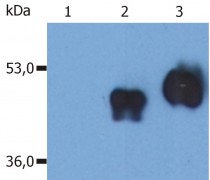ARG65491
anti-CD14 antibody [MEM-18] (low endotoxin)
anti-CD14 antibody [MEM-18] (low endotoxin) for ELISA,Flow cytometry,Functional study,Immunoprecipitation,Western blot and Human,Primates
Developmental Biology antibody; Immune System antibody; General Lymphocyte Marker Study antibody; Macrophages and neutrophils antibody
Overview
| Product Description | Azide free and low endotoxin Mouse Monoclonal antibody [MEM-18] recognizes CD14 |
|---|---|
| Tested Reactivity | Hu, NHuPrm |
| Tested Application | ELISA, FACS, FuncSt, IP, WB |
| Specificity | The clone MEM-18 reacts with CD14, a 53-55 kDa GPI (glycosylphosphatidylinositol)-linked membrane glycoprotein expressed on monocytes, macrophages and weakly on granulocytes; also expressed by most tissue macrophages. In human, the epitope recognized by MEM-18 is located between amino acids 57-64. HLDA III; WS Code M 253 HLDA IV; WS Code M 314 HLDA V; WS Code M MA087 HLDA VI; WS Code M MA95 |
| Host | Mouse |
| Clonality | Monoclonal |
| Clone | MEM-18 |
| Isotype | IgG1 |
| Target Name | CD14 |
| Antigen Species | Human |
| Immunogen | A crude mixture of human urinary proteins precipitated by ammonium sulphate from the urine of a patient suffering from proteinuria. |
| Conjugation | Un-conjugated |
| Alternate Names | CD antigen CD14; Myeloid cell-specific leucine-rich glycoprotein; Monocyte differentiation antigen CD14 |
Application Instructions
| Application Suggestion |
|
||||||||||||
|---|---|---|---|---|---|---|---|---|---|---|---|---|---|
| Application Note | WB: Under non-reducing condition. ELISA: The clone MEM-18 has been tested as the detection antibody in a sandwich ELISA for analysis of human CD14 in combination with clone B-A8 (ARG62727). Functional studies: The clone MEM-18 completely blocks binding of fluorescein (FITC) - labeled bacterial LPS to the monocyte surface and it also blocks the binding of CD14 to the extracellular TLR2 domain. * The dilutions indicate recommended starting dilutions and the optimal dilutions or concentrations should be determined by the scientist. |
Properties
| Form | Liquid |
|---|---|
| Purification | Purification with Protein A. |
| Purification Note | 0.2 µm filter sterilized. Endotoxin level is <0.01 EU/µg of the protein, as determined by the LAL test. |
| Purity | > 95% (by SDS-PAGE) |
| Buffer | PBS (pH 7.4) |
| Concentration | 1 mg/ml |
| Storage Instruction | For continuous use, store undiluted antibody at 2-8°C for up to a week. For long-term storage, aliquot and store at -20°C or below. Storage in frost free freezers is not recommended. Avoid repeated freeze/thaw cycles. Suggest spin the vial prior to opening. The antibody solution should be gently mixed before use. |
| Note | For laboratory research only, not for drug, diagnostic or other use. |
Bioinformation
| Database Links |
Swiss-port # P08571 Human Monocyte differentiation antigen CD14 |
|---|---|
| Gene Symbol | CD14 |
| Gene Full Name | CD14 molecule |
| Background | CD14 is a 55 kDa GPI-anchored glycoprotein, constitutively expressed on the surface of mature monocytes, macrophages, and neutrophils, where serves as a multifunctional lipopolysaccharide receptor; it is also released to the serum both as a secreted and enzymatically cleaved GPI-anchored form. CD14 binds lipopolysaccharide molecule in a reaction catalyzed by lipopolysaccharide-binding protein (LBP), an acute phase serum protein. The soluble sCD14 is able to discriminate slight structural differences between lipopolysaccharides and is important for neutralization of serum allochthonous lipopolysaccharides by reconstituted lipoprotein particles. CD14 affects allergic, inflammatory and infectious processes. |
| Function | In concert with LBP, binds to monomeric lipopolysaccharide and delivers it to the MD-2/TLR4 complex, thereby mediating the innate immune response to bacterial lipopolysaccharide (LPS). Acts via MyD88, TIRAP and TRAF6, leading to NF-kappa-B activation, cytokine secretion and the inflammatory response. Up-regulates cell surface molecules, including adhesion molecules. [UniProt] |
| Research Area | Developmental Biology antibody; Immune System antibody; General Lymphocyte Marker Study antibody; Macrophages and neutrophils antibody |
| Calculated MW | 40 kDa |
| PTM | N- and O- glycosylated. O-glycosylated with a core 1 or possibly core 8 glycan. |
Images (1) Click the Picture to Zoom In
-
ARG65491 anti-CD14 antibody [MEM-18] (low endotoxin) WB image
Western blot: 1. Untransfected HEK239 cell lysate, 2. cell culture supernatant from HEK 293 transfected with human CD14 cDNA, 3. HEK 293 cell lysate transfected with human CD14 cDNA stained with ARG65491 anti-CD14 antibody [MEM-18] (low endotoxin).
Clone References








